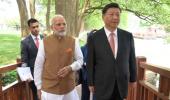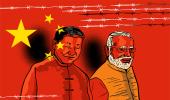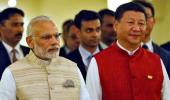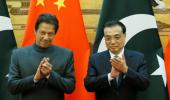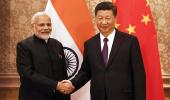'The scheduling of Imran Khan's visit to Beijing and its focus on the J&K situation underscores that Beijing shares the Pakistani concern that tensions with India are only going to escalate further in the period ahead,' says Ambassador M K Bhadrakumar.
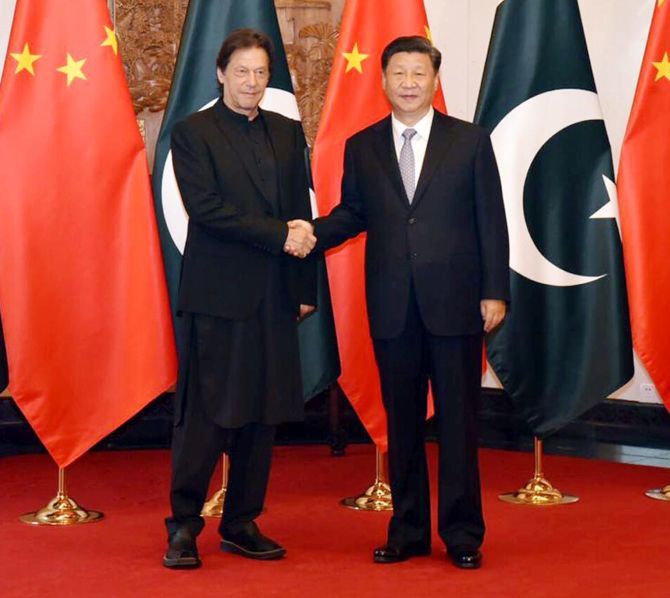
Pakistan Prime Minister Imran Khan's visit to Beijing on October 8-9 has been a runaway success from Islamabad's perspective. It revved up the dynamics of China-Pakistan Economic Cooperation projects, will most certainly intensify China-Pakistan defence cooperation and, importantly, reaffirmed whole-hearted Chinese support on Kashmir at the highest level of leadership in Beijing.
Although billed as a 'working visit', Imran Khan was accorded a ceremonial welcome by his host Premier Li Keqiang and was received by President Xi Jinping. Xi broke protocol to host a banquet lunch for Khan.
The timing of Khan's visit, his third visit to China in 13 months, is highly significant -- just before Xi's trip to India for an informal meeting with Prime Minister Narendra Modi on October 11 en route to Nepal for a State visit.
According to Pakistani Foreign Minister Shah Mahmood Qureshi, 'It was his (Xi's) desire and ours (Pakistan's) to take each other into confidence (before the informal meeting with Modi).' The nature of our relations is such that we take each other into confidence at every step.'
The Kashmir issue figured prominently in Khan's discussions in Beijing. Notably, Xi referred to the J&K situation. The Xinhua news agency reported:
'Khan briefed Xi on Pakistan's views on the Kashmir situation, hoping to avoid deterioration of the situation, saying that Pakistan values and appreciates China's objective and unbiased position.'
'Xi told Khan that China is paying close attention to the Kashmir situation and the facts are clear.'
'China supports Pakistan to safeguard its own legitimate rights and hopes that the relevant parties can solve their disputes through peaceful dialogue,' Xi said.'
The portions regarding the situation in J&K in the joint press release issued after Khan's visit are verbatim culled out from the joint press release issued after the visit by Chinese State Councilor and Foreign Minister Wang Yi to Islamabad a month ago on September 7-8.
Suffice to say, Beijing has rejected Delhi's sharp reaction to the Pakistan-China joint press release of September 8. It is a snub to Delhi.
Beijing's announcement regarding Xi's trip to India came only on Wednesday, even as Imran Khan was concluding his visit and departing for Islamabad.
In a meaningful remark on Tuesday, the Chinese foreign ministry spokesperson observed, 'There is a tradition of high-level exchange between leaders of China and India. We are in communication regarding bilateral high-level exchange going forward. The two sides should work to create a favourable atmosphere and environment for it.'
Clearly, Beijing took time to decide whether an informal meeting with Modi in the present vitiated climate of relations would serve any purpose at all.
After Wuhan, things indeed seemed to be looking up in Sino-Indian relations for a while. But the entire enterprise, which carried Modi's imprimatur, is in shambles today.
On the eve of Xi's visit, old war horses of the Indian establishment are coming out of the woodwork to smash up what remains of the Wuhan process to smithreens -- resurrecting the Dalai Lama and playing the 'Tibet card'.
Ironically, one of the highlights of Xi's visit to Kathmandu is expected to be the signing of a China-Nepal extradition treaty, which will make life hell for militants operating across Nepal-China border to destabilise Tibet.
As one surveys the debris of Wuhan, the residual question now is: What about the informal summit in Chennai? The Chinese side appears to place no high hopes on the coming event, which has become the remains of the day -- and, in any case, has become a sideshow now in Xi's diplomatic calendar, sandwiched awkwardly between the high-level exchanges with Pakistan and Nepal.
At a media briefing on Wednesday in Beijing, Chinese Vice-Foreign Minister (and former ambassador to India) Luo Zhaohui took pains to hype up: 'In Chennai, Xi will have an in-depth communication with Modi on issues that have overall, long-term and strategic significance on bilateral relations, set the tune and guide the direction for future development of the ties, and speak to the world in an unanimous voice, so as to inject positive energy into the world full of uncertainties.'
But the strain shows. When an experienced diplomat fails, we may anticipate that the optics are very poor.
In fact, with the return of 'Chanakyan muscular diplomacy' in South Block, India-China relations are likely to be on the roller coaster for the foreseeable future.
Khan's visit to Beijing is a stark reminder -- if one is needed at all -- that China will not stand by passively if there is an eruption of India-Pakistan hostilities. Xi assured Khan that China 'will continue to firmly support Pakistan on issues concerning its core interests and of major concern to it'.
The China-Pakistan joint press release forcefully articulates that 'the two sides reaffirmed their support on issues concerning each other's core interests (read Kashmir). Chinese leaders reiterated solidarity with Pakistan in safeguarding its territorial sovereignty, independence and security.'
Against this backdrop, the presence of Pakistani army chief General Qamar Bajwa as part of Imran Khan's delegation was highly symbolic.
General Bajwa was received by People's Liberation Army Commander Army General Han Weiguo and General Xu Qiliang, vice chairman of the Central Military Commission. He also accompanied Khan for the meeting with Xi.
General Bajwa reportedly 'apprised Chinese military leadership regarding the consequences of the ongoing situation' in J&K and the two sides 'agreed that continued unresolved Pak-India tensions will have serious implications for peace and stability in the region.'
In a commentary last week, the former director-general of Pakistan's ISI General Asad Durrani wrote, 'After its constitutional ,em>coup d’état over the part of the disputed territory it controls, the Indian defence minister threatened to next liberate Pakistani administered Kashmir. We now have reasons to suspect that the declared aim of the Rashtriya Swayamsevak Sangh, the spiritual fountainhead of the party in power, to undo the Partition of the subcontinent, must be taken seriously.'
'The choice that Islamabad has to make is when and where to stop this juggernaut -- while the people in Indian-controlled Kashmir are still resisting the loss of their symbolic autonomy, or after they have been subdued.'
The scheduling of Imran Khan's visit to Beijing and its focus on the J&K situation underscores that Beijing shares the Pakistani concern that tensions with India are only going to escalate further in the period ahead.
This no doubt casts a dark shadow on Xi's informal meeting with Modi, no matter the pretence that the so-called India-China Closer Development Partnership is the leitmotif of the weekend's event in Chennai.
